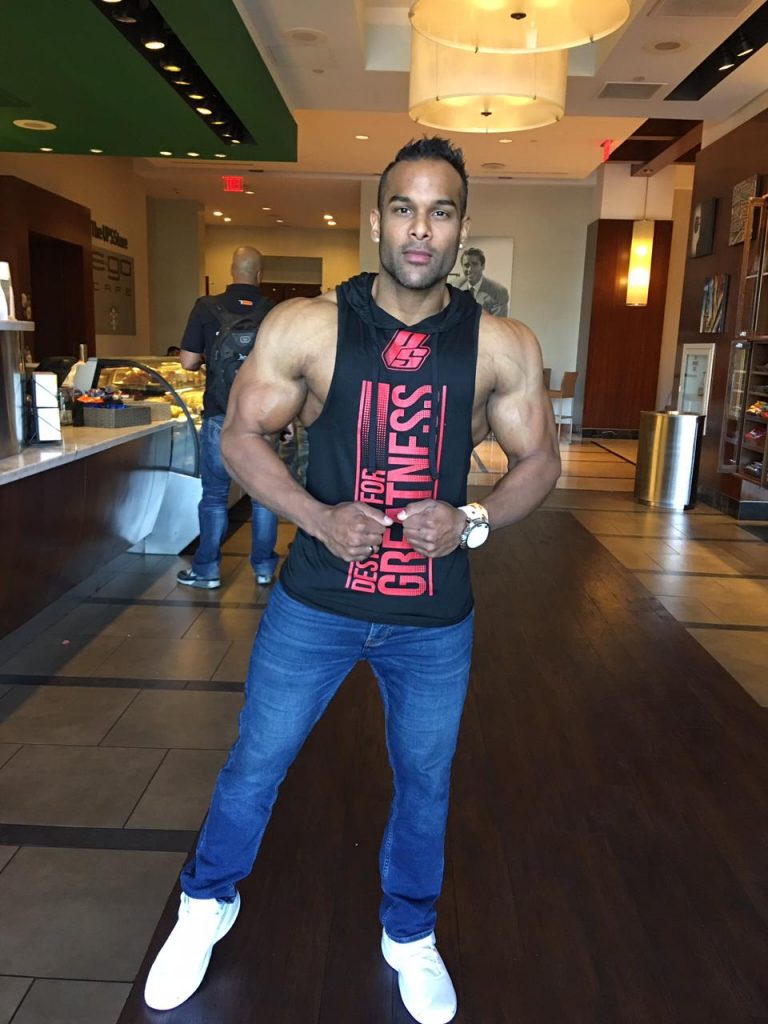Bandleaders, psychologists: 'No one should set Carnival body standards'

A comment by a fitness coach and purveyor of sports supplements on the standard Carnival band leaders should set about the look of the women they allow to play mas in their band has resulted in a wave of criticism on social media, and a possible boycott of his services and supplements.
Imran Razac, founder of the St Augustine-based Body by Imran, in a Facebook post on Ash Wednesday suggested that plus-sized women should lose weight before playing mas in order for them to look more presentable in their Carnival costumes. He then offered advice on how they should go about getting a Carnival body.
Many people took to social media accusing Razac of body shaming and discriminating against full-figured women.

Razac responded by saying his post was not meant to offend but to encourage people to get in shape. He said he understands that many women suffer from different types of medical issues, such as polycystic ovary syndrome or diabetes that make it difficult for them to lose weight, but he has helped clients with such health issues achieve their goal – all the while maintaining that excess fat and cellulite have no place in mas.
Razac did not respond to queries seeking further comment by Newsday.
When Sunday Newsday contacted Varma Lakhan, bandleader of Antourage Productions and designer of the 2024 Carnival King and Queen costumes, he said as a bandleader and fitness instructor, specifically spin and aerobics, he does not believe bands should only cater to physically fit people to improve the aesthetic of their bands.
“You can’t tell someone how to feel and what to do when it comes to playing mas. You can’t get size zero people only to play mas, and if bands encourage that, it would be totally wrong. That’s going down a discrimination avenue and he (Razac) is making people feel uncomfortable.”
He said categorising people is wrong and some women are very comfortable with their bodies no matter their size. He said he has seen beautiful plus-sized women playing mas and their size even enhanced the costume’s design.
Another bandleader dismissed Razac’s statements, saying almost everything some people do around Carnival is a marketing strategy, suggesting that with his statements he would reach those he wants to. He said he has no doubt Razac got more clients from the "stunt."
“But at what cost? That probably doesn’t matter to him.”
Comments under Razac's post ranged from guarded agreement to disgust and anger. Some people said he probably meant well with his advice, but described his delivery as insulting. Others advised him to hire a social media manager.
One person said she did not agree with Razac because, even though it's important to maintain a healthy lifestyle, Carnival is not a fitness conference and masqueraders are not there to serve as eye candy for spectators.
She said some women suffer from a variety of reproductive, medical and genetic issues that cause them to gain weight or have cellulite even if they exercise regularly.

Counselling psychologist Sule Joseph said the original post could be misinterpreted and Razac may not have meant to sound attacking but, in his responses to people’s comments, he doubled down on the view that overweight people must lose weight if people should have to look at them playing mas.
He said the conversation could have happened in a more respectful manner, and Razac crossed the line into being disrespectful, making the conversation about himself rather than about health.
He told Sunday Newsday Razac’s comments made him seem very fat phobic or biased against overweight people.
Joseph said he is also concerned that Razac wanted to place limits on some people's mode of stress relief, as during Carnival the music can be very therapeutic and act as a time of release for many.
“I don’t know if that is the best coping mechanism – to hold on to stress for a whole year and only release it for a week – but this is one time when you're supposed to be able to let go and just be. And it works for some people.
“I am not negating that we need to watch what we eat and we need healthier lifestyles. But, I am saying that the minute we force Carnival to be something that only a unique bunch of people can participate in if you look a certain way, then we are going down a very dangerous road.”
He said Carnival should not be a competitive, stressful thing where people feel they cannot not participate if their bodies are not “perfect.”
He questioned where the line be drawn if such thinking was allowed to pervade Carnival. And who would determine if a person could participate? What if that person does not like a masquerader’s calves even though they have a toned upper body?
He said Carnival could be used as a motivating factor for making healthier decisions rather than telling people what body types should be allowed to play mas.
“If you don’t like what you see for Carnival, don’t come out! Go and play mas in your backyard. You get buff, get all your friends who are sexy to your liking and just play in allyuh little circle.”
Psychologist and educator Dr Margaret Nakhid-Chatoor also sees Razac's comments as a type of discrimination for which there is no justification.

She said body shaming others by making inappropriate, negative, humiliating comments about their body size and shape is unnecessary in any context.
“His bias and discriminating message is clear – that if you don’t measure up to his standards of beauty, you should feel inadequate, unworthy, and remove yourself from our national festival at a time for people to release their frustrations and be themselves without criticism.”
She said he was one of many who was ignorant to the impact his words could have on people, much like family members and friends who often make statements like, “Aye, aye, yuh getting fat,” while not understanding the mental trauma such statements could inflict.
“Unfortunately, we have become a society that is fixated on how people look and outward appearances. If you just look at TikTok, Facebook, Instagram, it has what we call a selfie culture which emphasises outward beauty. And many people are choosing to share their best pictures online using filters and editing apps because they don't want people to see the real them.”
Nakhid-Chatoor said many studies have shown the more people are exposed to anti-fat or weight bias and discrimination and internalise it, the more likely they are to gain weight and become more obese – a self-fulfilling prophecy.
This could lead to depression, anxiety, low self-esteem, increased risk for suicidal thoughts and behaviours, eating disorders, avoiding exercise and body dysmorphia – a mental health condition where people spend a lot of time worrying about flaws in their appearance. She said even medical professionals focus on health rather than size or weight, so Razac's comment is coming from a place of a lack of understanding. She said the conversation should instead shift from other people’s bodies to overall physical and mental health.
His statements, she said, highlights the need for this year’s International Women’s Day theme, Inspire Inclusion.
“When we inspire others to understand and value women's inclusion, we forge a better world. When women themselves are inspired to be included there is a sense of belonging, there's relevance and empowerment.
“The message here is you have to embrace inclusion, you have to be tolerant, you have to examine the prejudices and biases that you may have about people's appearances. And this means that you have to encourage the acceptance and celebration of shape and diversity in appearance. And this is what we do in Carnival.”

Comments
"Bandleaders, psychologists: ‘No one should set Carnival body standards’"